For many people, maintaining a healthy weight can be a lifelong struggle. It’s easy to fall into the pressures of weighing yourself every day and only eating lettuce buns. However, that isn’t sustainable for a large majority of people, and it is also just plain tiring. There’s a reason why most people who lose a lot of weight end up gaining it back a couple years later. The most effective way to shed the pounds for good is to focus on creating a sustainable lifestyle that you enjoy living, and not on how little you can eat or what the scale says.
Most people agree that maintaining a healthy weight comes with an array of health benefits, but how to lose weight is debatable. Diet culture rhetoric that promotes excessively restrictive eating habits and fad diets is not a thing of the past. There’s always a new trend to watch out for.
One person says keto is the best, another says vegan is the best, then on top of that, you have people telling you that you need to cut out all of your favorite foods forever or else weight loss won’t work. These fads rarely do anything good for people, instead they usually lead to “yo-yo dieting,” which is essentially a restrict-binge cycle that makes you lose weight at first before gaining it all back or more.
Here’s why restrictive eating doesn’t work
Not all restriction is bad, but there should be some balance in the approach. If you know that Chick-Fil-A is your kryptonite and you normally eat it five times a week, try to cut down the frequency instead of cutting it out altogether.
This takes the power that food has over you away. You’re no longer viewing it as this untouchable prize that you can’t have. You are no longer worried that you can never eat Chick-Fil-A again if you want to lose the weight and keep it off, because you understand that it’s still there for you to eat within moderation.
As a dietitian, what I usually end up seeing is that people will cut the snacks, desserts, and fast food out entirely and then get the urge to eat those foods again. When people do, however, they feel out of control and end up overeating. Then, this snowballs into falling back off the diet wagon before trying it all again.
For others, severe restriction can lead to an obsessive eating disorder, where there is an unhealthy fixation with always eating the “best” or “clean” choices. This can be equally if not more dangerous than yo-yo dieting.

How can you break the cycle?
There’s so much noise out there on what to eat, how much to eat, what to cut out, and what to buy. In reality, the key is to just focus on making lasting behavioral changes and not stressing over the number on the scale or weighing your food.
In fact, lowering stress is one of the best things you can do for encouraging weight loss. Sometimes, this is easier said than done, but it is the surest way to make weight loss both practical and enjoyable.
Eat a variety of protein, healthy fats, fruits, vegetables, whole grains, and drink enough water. Even if you still eat your favorite candy bar a couple times per week or go out to dinner with your family on the weekends, you will very likely still find yourself dropping the pounds.
Also, remember that weight loss (and even weight maintenance) is a marathon and not a sprint. Figure out what works best for you and your body and focus on making small changes over time rather than huge ones all at once. A registered dietitian can work with you on making a plan that suits your lifestyle needs to make weight management a much more approachable idea.
